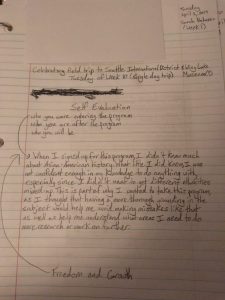
TagWeek 1
- “A 2004 campaign intended to attract Asian and Pacific Islander Americans to McDonald’s saw the launch of a website called “I-am-asian.com,” a phrase McDonald’s also claims to have trademarked as an intellectual property…” (Alien Encounters, pgs. 13-14)
- This astounded me when I read it. Wouldn’t trademarking that phrase imply that only McDonald’s owned the right to state that you are Asian, so they could potentially sue people or television shows or whatever if they said it? (As in, claiming that a show used their “intellectual property” if a character said “I am Asian”.) Can they even do that? This article says that this happened in 2004, was there any backlash at the time? It doesn’t mention anything further about that.
- “…some Asian American cultural producers have had to confront the conflict between their “oppositional” practices, which attempt to break down discourses about their inherent exoticness, and the transmission of these practices in a market that capitalizes on those very ideas of otherness.” (Alien Encounters, pg. 15)
- My understanding of this is that even if Asian Americans are making things that are trying to humanize and normalize Asians in American culture, they’re still participating in a system that fetishizes and dehumanizes them. Does this mean that the authors are saying that, in order to create change in a system, you have to become complicit in the system that you’re trying to change?
- “Asian American music critics… find themselves responding again and again to suggestions that Asian Americans don’t listen to or are not “able” (or “real” enough) to make indie rock, punk, or hip hop music.” (Alien Encounters, pg. 16)
- This made me think about how important representation in media is, and how it normalizes things that might have seemed strange to people who would otherwise only be familiar with stereotypes. I grew up watching American Dragon: Jake Long, which was a Disney Channel cartoon in the early 2000’s. The main character, Jake Long, was a Chinese American who lives in New York. In the show, he was often portrayed as listening to a lot of hip hop and other music that tends to be associated more with African American culture than with Asian American culture, but because I grew up watching this show, it never occurred to me to think it was “strange” that he didn’t fit into a stereotype of an Asian person.
- “These new technologies emerged in tandem with what we alluded to earlier as a particularly Asian cybernetic imaginary. Beginning in the 1980s, the threatening specter of the mechanistic, and supposedly “soulless,” Japanese (on whom, of course, the “greatest” technological weapon of World War II was unleashed by the United States in the form of the atomic bomb) began to cast its shadow on American culture. Apparent admiration for “Japanese efficiency” slid easily, and quietly, into fears of a hyperrationalized, corporate empire of the rising sun.” (Alien Encounters, pg. 27)
- Why were these fears developing in the 1980s as opposed to during or immediately after World War II, when we were at war with them? What was going on in the world at the time that could have caused or contributed to people fearing a corporate Japanese empire?
© 2025 Sarah's A-POP Blog
Theme by Anders Norén — Up ↑